#pregnancy prevention
Text

[I.D.: screencap of a tweet from user NailsNCrowns that reads, "someone put together a Google doc of 150 gynecologist that will tie your tubes without asking if you have kids, your marital status and no matter your age. Its sorted into alphabetical order by state." (they include the link to the doc here. Doc linked at end of this post). The same user comments on their post, "if your city isn't on the list, please check back in a few hours because this list is updated hourly. (3 heart emojis) /End I.D.]
A friend of mine sent me this screen shot and a link to the Google doc. I've seen lots of posts about how to avoid pregnancy in light of roe v wade being overturned but nothing about this Google doc yet so I figured I'd make one. I know not everyone is in a position where surgery is an option, but for those who do want and can get their tubes tied, it's often difficult for them to get doctors to agree to it if they're young and unmarried or married without kids because they "might change their mind," which is misogynistic and condescending enough to deserve its own post but I digress. This is a crowd sourced list, the email to submit a doctor if you know one or are one is listed at top of the doc. Stay safe, friends.
#roe v wade#abortion rights#pregnancy prevention#tubal ligation#crowd sourcing#us politics#reproductive rights#r v w#sterilization#ask to tag#women's rights#current events
9K notes
·
View notes
Text
Question: Can you get pregnant if you have sex on your period?
(This is one of the most common questions students asked me.)
Answer: Yes! A person absolutely can get pregnant if they have sex during their period.
In order for someone to get pregnant, two things need to happen:
A sperm cell needs to meet an egg cell and fertilize it;
The fertilized egg cell (called a zygote) needs to attach itself to the lining of the uterus.
Now, it's true that this is unlikely to happen while a person is on their period. However, here's the catch: sperm cells can live in the uterus and fallopian tubes for up to a week! Which means that there's a chance, however slim, of one of those sperm cells hanging around until the next time that person ovulates (when one of their ovaries releases an egg cell).
If that happens, it's possible for you to get pregnant. Is it super likely that this will happen? No. But if you're trying to avoid pregnancy, it's best not to take any chances and always use a method of contraception like condoms or hormonal birth control (and no, HRT is not a form of birth control).
--------
Thanks for reading!
Got a question? Send it in!
7 notes
·
View notes
Text
What Is An Intrauterine Device (IUD)?

An intrauterine device (IUD) is a small device that is inserted into a woman’s uterus to prevent pregnancy. It is a type of long-acting reversible contraception (LARC) that works by preventing sperm from reaching and fertilizing an egg.
IUDs are a safe, reliable, and convenient form of birth control. They are effective for up to 5–10 years, depending on the type of device. Once inserted, they require no daily maintenance, and there’s no need to remember to use them every time you have sex. IUDs are also one of the most cost-effective long-term methods of birth control.
There are two types of IUDs: hormonal and nonhormonal IUDs. Hormonal IUDs contain the hormone progesterone and prevent pregnancy by thickening cervical mucus to block sperm from reaching the egg, thinning the lining of the uterus to prevent implantation, and suppressing ovulation.
Non-hormonal IUDs are made of copper and release small amounts of copper ions, which create an environment that is toxic to sperm and prevents them from reaching the egg.
When inserted correctly, IUDs are over 99% effective at preventing pregnancy. They do not protect against sexually transmitted infections, so using a condom or other barrier method is still recommended.
IUDs are a great option for women who are looking for a long-term form of birth control that is safe, effective, and convenient. To learn more, contact Her Smart Choice women’s health clinic.
0 notes
Text
Hey I just did this but if you ever need this for people in the US a easy way to get birth control without acess to a doctor here’s how I did it. (I’m an out of state college student hence why I did it this way)
Keep in mind this may vary from state to state
I got the planned parenthood direct app.
I filled out a questionnaire about needing birth control.
I paid $25 at the end
3 days later I went to a pharmacy (you can also have it mailed to you) gave them my insurance card and got my 1 month prescription for $0 but it depends from insurance carrier and now I have birth control
1 note
·
View note
Text
Pregnancy Prevention/Birth Control/Safety Info
When it comes to birth control there is more to consider than just the pill today, we have many different methods of birth control to choose from, each has its pros and cons some are more effective than others. There are many types of birth control.
Reversible
Non-reversible (Permanent Sterilization)
Long acting
Short-acting
Hormonal
Non-hormonal
CLICK HERE:
1 note
·
View note
Text
#feminism#abortion#tubes tied#pregnancy#pregnancy prevention#roe v wade#united states#women’s rights#violence against women
1 note
·
View note
Text
Men, if you tell a woman that a condom legitimately doesn't fit/is too tight/too loose/uncomfortable and she's tells you're a liar because she can put her foot into a condom then tell her to put said foot up her ass and show her the door.
I'm so over this stupidity of women being fully convinced that all condoms fit all penises and any man who says otherwise is a liar and any women who say other wise are "pick me's".
I don't know, I'd be pretty upset if my partner got me a dildo that was too big and when I explained why they bit back with "Well the vagina can stretch enough to birth a baby so you're just lying." A man saying that would be horrible and pretty scary.
But it's totally fine when a man says a condom doesn't fit for a woman to say "Well condoms can stretch over people's legs so you're just lying." So you want to shame a man into wearing a condom doesn't fit? A condom that prevents things like pregnancy and STIs??? Idk but I'd REALLY wanna make sure it fit properly to protect my body from those.
It's just amusing that the "Men don't know a womans body!!!" crowd think that they know everything about a man's body. Sweetie, you don't. Shut up.
(using gendered words because I feel like this is mainly something cisgendered women do because those are the people I see acting like this. From what I've seen non-straight and/or non-cis folks tend to be more respectful when their partner is legitimately physically uncomfortable)
0 notes
Text


From what i've heard abt manscaped that corp can go rot but I have to admit I burst out laughing at this
#as a german i have never had the displeasure of seeing the legendary ball shaving ad#but I've heard the tales#it's still viagra and pregnancy-prevention pill ads for me :(#tumblr still confused abt my gender#i'm reading Tumblrs twitter like the morning paper#tumblr
1K notes
·
View notes
Text
I don’t know who needs to hear this but…
PREGNANCY SHOULD NOT BE CONSIDERED A PUNISHMENT FOR HAVING SEX!
#roe versus wade#roe v wade#roe vs. wade#scotus#abortion#i hate that this is the opionion of so many#like yes pregnancy is a possibility everytime there is vaginal intercourse#but when people take every single precaution to prevent that and it doesn’t work#why wouldn’t they have the option to terminate something they tried to prevent??#people telling others to suck it up just rubs me the wrong way#saying ‘just don’t have sex’ is a stupid fucking argument
1K notes
·
View notes
Note
You said omegas are only fertile when they're in heat correct? And that outside of their heat they are not fertile. Betas/Alphas are always fertile however. So they would need to use birth control/protection for sex right? I think I remember reading that reader had an implant so she wouldn't get pregnant during her heats? Unless I just completely made that up. I was trying to figure out if accidental pregnancies happened in this universe like they do in the real world? Or is birth control in this universe like 100% effective. Would unwanted pregnancies mess up pack dynamics and cause all kinds of emotional turmoil in this universe since they're more instinctive? Like would omegas distress, alphas become beyond angry, and betas just don't know what to do/how to handle it? Or is it like real world and everyone freaks out but they just have to deal with whatever happens. Basically what would happen if there was an unwanted pregnancy/do unwanted pregnancies even happen in this universe/how does everyone react? Sorry I tried to explain what I was trying to ask the best I could.
Hi anon!! I get what you're asking, don't worry!!
So, yes. Omegas are only fertile during their heats and alphas/betas are more like us and are sort of always fertile. Alphas and betas have more traditional methods of protection. Things like condoms and birth control like we're used to in our universe. Omegas have a specialized implant that doesn't prevent heats, but just prevents fertility during heats. It's not 100% effective, just like other birth controls, but it's a very, very low chance of pregnancy happening. So accidental pregnancies can and do happen.
As far as how they're handled, it just sort of depends on the situation and those involved, as well as how it happens. For an omega that is adamant about not having pups, or perhaps wasn't ready yet or still deciding, an unplanned pregnancy is obviously going to cause some distress, especially if there's no established pack for that omega. If both alpha and omega were against pups then yeah, that's going to cause some disruption in the dynamic. It's not all that different to how you would expect different people to react in our world to an accidental pregnancy. Some might take it in stride and deal with the hand they're dealt. Others might really struggle with it.
Yeah, it just kind of depends on the preferences of those involved, the situation, the support system, all of it.
#most packs are pretty good about family planning but even then things aren't perfect#there's no guaranteed pregnancy prevention#besides abstinence of course but that's not always an option especially for omegas#answered#crcb lore
43 notes
·
View notes
Text
We can’t ALL be doomed by the narrative some of us have to make our own tragedies
#this is about nat#yes it was narratively unsatisfying yes that is the point#it’s real and preventable and undignified it’s falling off the toilet cliff with the shit bucket#it’s surviving a plane crash wolf attack and three different fires only to get cancer#it’s the worst person you know convincing you not to kill yourself#it’s friendship ending pregnancy for a baby who didn’t live#yellowjackets#yellowjackets showtime#yellowjackets s2#yellowjackets season 2#yellowjackets spoilers#jackie taylor#natalie scatorccio
113 notes
·
View notes
Text
Just me sitting here in church thinking about how many people are put on birth control to deal with hormonal imbalances instead of medical professionals putting in the work to figure out what’s going on when birth control has so many negative side affects
#btw if you have PCOS or endometriosis I’m not talking about you#if you don’t and your doctor put you on birth control to do something other than prevent pregnancy you should be asking questions
22 notes
·
View notes
Text
harry getting ready for his first house party during summer and james insisting to go with him because he's good at parties
parents not allowed, dad
but i'm not a normal dad, i'm a cool dad !
#JUST JILY BEING THE MOST EXTRA DURING HIS TEEN YEARS#harry we love you but please PLEASE don't get someone pregnant so young#being forced to learn contraceptive spells from his OWN MOTHER to prevent more teen pregnancies in the family#being told by professors his parents are being a pain and trying to get in to WATCH HIS FIRST QUIDDITCH MATCH BC WHAT DO YOU MEAN WE CAN NO#WATCH OUR BABY#i hate my life#joanne is a fucking loser who hates happiness#bitter fucking bitch#lari talks a lot#james potter#harry potter#lily evans#the marauders#marauders era#marauders headcanon#marauders#jily#jily headcanon
24 notes
·
View notes
Note
Hey, nexplanon is approved to prevent pregnancy for 5 years. They won't change the packaging because they want people to replace it every 3 years so they can get money. I work at a sexual wellness clinic. It's a whole thing with lots of long acting reversible contraceptives. Anyway that doesn't help you remember to remove your bandaging but it could happen less often!
I actually keep talking my ob/gyn into replacing mine every 2.5 years because that's when I start getting periods again >w>;;; but! this is good to know!! especially if i end up quitting my job to disappear into the woods and not have insurance, lmao
#original#pregnancy prevention is theoretically my number one concern#but my periods render me fully nonfunctional#when i went off bc for the first time in ten years for insurance reasons i. almost went to the er. before i remembered.#it's tolerable if i'm a writer hermit and can lay in bed with chamomile tea all day#but if i have to be capable of leaving the house then having periods is Not It
64 notes
·
View notes
Text
Resources For Pregnant Women
The following is a list of free and confidential resources for pregnant mothers in need and includes information on a variety of topics:
Pregnancy counseling
Emotional support
Medical care for mother and baby
Financial and housing support
Adoption options (if so desired)
Domestic violence resources
Pregnancy Help, Resources, and Abortion Alternatives
National Life Center Pregnancy Hotline
800-848-5683
www.nationallifecenter.com
Optionline
800-712-4357
www.optionline.org
Bethany Christian Services
800-238-4269
www.bethany.org
Stand Up Girl
www.standupgirl.com/girl-help/need-help-now/
Birthright
800-550-4900
www.birthright.org
Good Counsel Homes
800-723-8331
goodcounselhomes.org
Nightlight Christian Adoptions
502-423-5780
www.nightlight.org
Adoption Network Law Center
800-367-2367
www.adoptionnetwork.com
Safe Haven for Newborns
A confidential safety net for pregnant women or mothers with newborns who do not feel capable of caring for their child and need immediate help.
844-767-2229
www.asafehavenfornewborns.com
Abortion Pill Reversal
For pregnant women who have taken the first dose of the "Abortion Pill' (RU-486) but have not yet taken the second medication (Misoprostol), which is administered twenty-four to forty-eight hours after taking RU-486. This website provides information on medications with the potential to reverse this "medical" abortion process.
877-558-0333
www.abortionpillreversal.com
Post-Abortion Counseling
Hope after Abortion
888-456-4673
www.hopeafterabortion.org
National Domestic Violence Hotline
800-799-7233
Suicide Prevention Hotline
988
Learn About Your Growing Baby
Pregnant and Panicked? Here's What to Expect during Your Pregnancy
Keeping Mom and Baby Healthy during Pregnancy
Fetal Development: Month by Month (Images and Information)
Fetal Development: Week by Week (Images and Information)
Baby Developmental Facts
Video: "Nine Months in the Womb" (Fetal Development)
Video: "Life in the Womb (9 Months in 4 Minutes) (Fetal Development)
#pregnancy#pregnant need help#help#prolife#pro life#pro-life#post abortion#abortion#suicide#suicide prevention
174 notes
·
View notes
Text
'A woman who falls through the cracks is falling with her children'
Away from threat of Islamist violence or floods, health risks for pregnant women in Nigeria's refugee camps remain high
By Adie Vanessa Offiong, CNN
Photographs by Taibat Ajiboye for CNN
Editor’s note: This story is part of As Equals, CNN's ongoing series on gender inequality. For information about how the series is funded and more, check out our FAQs.
Abuja, Nigeria (CNN)Aisha Aliyu is eight-months pregnant and sprawled out on a mat in front of her house with four of her children spread around her feet. Two-year-old Hauwa and five-year-old Abba are both crying and tugging at their mother's coffee-colored hijab. She, in response, rolls her eyes and clicks her tongue at them. She looks tired.
The child Aliyu is carrying is her tenth. The last four were delivered in the Durumi Camp, a place in Nigeria's capital city, Abuja, that she and an estimated more than 3,000 other internally displaced people call home.
In 2013, Aliyu fled her home in the village of Wala in Nigeria's northeastern Borno State to its capital, Maiduguri. She said her village was attacked and much of it burned down by armed Islamist group, Boko Haram. Two years later, the militant group attacked Maiduguri, forcing Aliyu to again migrate, this time travelling over 856km south to Abuja with her husband and five children.
The now 39-year-old saw having many children as a way of replacing her relatives killed by the insurgents, but reveals she was done after her last pregnancy in 2021 and began using contraceptives. However, she became pregnant again this year.
Having already borne children in Durumi camp (one of 264 communities for internally dispaced people (IDPs) known to exist across Nigeria as of September 2021), Aliyu was fearful, knowing of the limited resources she would have access to. The farmer's wife had been unable to afford the food and medication she needed to stay healthy, and antenatal services were limited.

Aisha with five of her children
The space initially set up as a birthing suite at the camp was rudimentary and barely hygienic, explains Liyatu Ayuba, appointed the camp 's Women's Leader by the site's Chairman when she arrived in 2014. She has since handled issues regarding health, food or children on behalf the IDPs.
"It was a tent that we swept, and I would put a mat or wrapper on the floor for the women to lie down on to give birth," says Ayuba, who for much of the camp's history has been its only birth attendant. Many of the displaced women refer to her as Mama.
Ayuba says the tent was a shanty built with corrugated roofing sheets and a sandy floor. If gloves were available, the birth attendant used them and if not, she explains that she covered her hands with polythene bags and cut umbilical cords with a razor blade.
"I gave birth to three of [my children] with Mama's help on a mat under the shelter," Aliyu tells CNN, referring to the birthing tent. "Mama cut the umbilical cord and bathed the baby."
In 2019, a non-governmental organization set up the camp's health post where Aliyu's ninth child, Hauwa, was delivered in 2021. The post is a small clinic located inside a repurposed 20ft shipping container, where wooden boards partition the space to create a delivery suite which looks more like a storage space and just about holds a bed, a baby cot, a drip stand, a broken chair, a trolley and empty containers that should contain water. The other half is the consultation room with a table, two chairs, a bed, and a cupboard where medicines and devices are kept.
Though basic, the clinic at least provides a consultation space that women previously had to make do without and Ayuba is proud to say the camp has not recorded any deaths among mothers or babies under her watch.
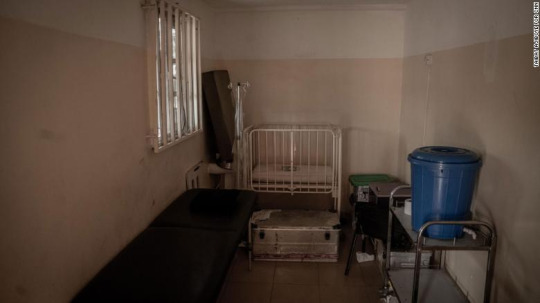
The makeshift delivery room partitioned in the shipping container used as the camp's health post
'No 'special arrangement' for those who are pregnant in Nigeria's camps
Aliyu is one of many internally displaced women bearing children in Nigeria's camps, with some grounds not even housing a health post or shelter for birth, instead needing women to go into labour in their own shelters or that of their birth attendant.
A 2021 PhD thesis by Fatima Mahmood Jibirilla at Walden University, states that women living in IDP camps in Nigeria "have a higher risk of maternal death than women living in their homes." The author cited a range of factors increasing the risk of maternal and neonatal deaths in these settings, including inadequate prenatal care services and limited family planning programs.
"There are no special arrangements for pregnant women in IDP and refugee camps [in Nigeria]. There are poor antenatal services that are inadequate to detect and address likely pregnancy-related complications and other signs of poor pregnancy outcomes," the author writes. While there have been no maternal or infant deaths at Durumi on her watch, according to Ayuba, multiple doctors volunteering there and across camps in Abuja corroborated the concerns highlighted in the study to CNN.
In a country that has long had among the highest maternal mortality rates in the world and has the third highest number of internally displaced people (IDPs) in Africa as of the end of 2022, according to the Internal Displacement Monitoring Centre (IDMC), the lack of adequate maternal healthcare provision in these camps is a significant concern, one of the doctors told CNN.
The 2022 IDMC figures also show that 4.5m Nigerians were classed as "internally displaced people" as a result of both conflict and natural disasters, with flooding outstripping protracted violence as the main source of displacement.
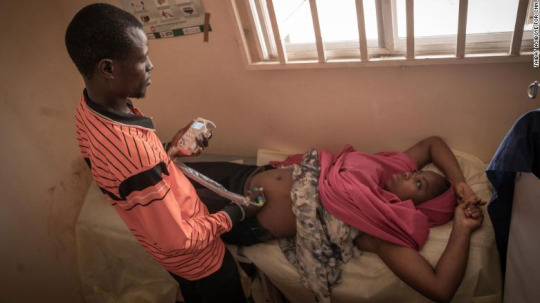
The camp nurse, Isa Umar examines a pregnant woman during antenatal session
While there is no national breakdown of IDPs by sex or age, a 2023 report by the Camp Coordination and Camp Management (CCCM) Sector says there are 1,575,741 women and children in the Nigerian states of Borno, Adamawa, and Yobe alone, making up 74% of the 2,124,053 IDPs in those states.
Nigeria's total IDP population relies largely on the graces of charitable organizations for its health care, Ayuba and the camp's nurse Isa Umar told CNN.
'If it happens, I am dead.' The prohibitive costs of care
Wednesdays are antenatal day in Durumi. When CNN visits, camp nurse Isa Umar, who himself was forced to leave his home due to the insurgency, is in the consultation room using a handheld ultrasound scanner to monitor a baby's growth and a fetoscope to monitor the heartbeat among the expectant mothers coming in.
Umar measures each pregnant woman's stomach followed by her weight. After they've been seen, women compare notes while sitting on the clinic's veranda, discussing how any of the medicines Umar has prescribed will be paid for.
The set up is far from adequate. Umar tells CNN: "We don't even have folic acid or anti-malarial medicine to give them. I have to write these for them to go and buy." Malaria is endemic in Nigeria and infections pose various risks during pregnancy, such as premature labour and miscarriage, and folic acid is recommended for those who are pregnant or planning to become pregnant, to reduce the risk of certain birth defects.
But for most of the 64 women recorded in the camp's birth register this year, these costs are prohibitive. Folic acid, for example, costs ₦3,000 ($3.74) for 100 tablets and Aliyu tells CNN she could not possibly have afforded that cost for the duration of her pregnancy. She says she's only been able to take this vital supplement when NGOs have donated them free of charge. Back home in Wala, her N100 ($0.11) hospital card had entitled her to free folic acid as well as other resources while pregnant.
Getting clean water at the camp is also a challenge, Aliyu shares, explaining that it's a time-consuming, strenuous task requiring her to make several trips daily and is one she can no longer do in the final weeks of her pregnancy. Instead, she now pays for it to be delivered. At its cheapest, enough water to make the family's breakfast of pap (porridge made from ground corn) and other domestic chores for a month costs ₦24,000 ($28.43). Costs can rise by 25% on days when there is no electricity and a generator is needed to work the pumps, or when water sellers must go farther to fetch it.
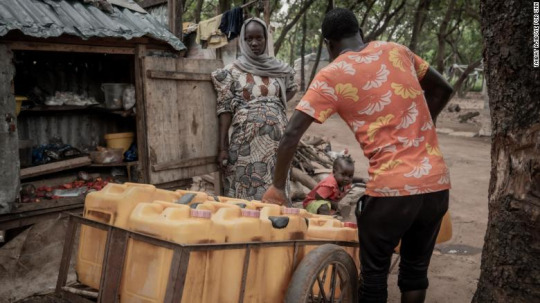
With Aisha almost full term, she is no longer able to go to fetch water and now has to pay up to N500 daily for it to be delivered to her home
There are also the costs of giving birth in Abuja that Aliyu didn't have back home.
To immunize her babies at the camp, the mother of nine has to take them to the nearest government hospital where nurses have certain expectations that fall to the mother, she tells CNN. These include making sure the baby is wearing diapers and bringing various items including cotton wool and baby lotion, which would cost money Aliyu says she doesn't have.
"In Borno, it was not compulsory to use [diapers] when going to the hospital. We just used our wrappers (a piece of fabric women tied around their waist). But here, the nurses insist that (the babies) must wear diapers and (we must) have an extra one in our bag," Aliyu says. Multiple mothers shared similar concerns with CNN.
Dr Charles Nzelu, Head of Special Duties at Nigeria's Federal Ministry of Health tells CNN he believes health workers are simply acting in the overall interests of the baby and that a lack of medical skill, experience, and communication is resulting in a lack of understanding about the women living in the IDP camps. "When you come to me as a doctor, I will give you medical advice the way it's supposed to be," he explains. "When you are more experienced, you are flexible (with) the way you relate with patients." He adds that this government, which came into power in May, will work to address issues like these.
"I can't afford treatment. If it happens, I'm dead"Pregnant resident of Durumi Camp in Abuja, Aisha Aliyu
In the meantime, Aliyu says she is struggling to meet all her needs and those of her children. To afford what she can, Aliyu makes and sells wigs and traditional caps worn by men, earning on average ₦10,000 ($12.49) a month.
Money is not her only concern. Aliyu worries about catching malaria and about not being able to produce enough breastmilk because of the poor quality of her diet. Her family survives on staples such as pasta and maize in different forms.
"I can't afford the treatment" for malaria, says Aliyu. "If it happens, I am dead."
Difficulty fulfilling promises
The National Commission for Refugees, Migrants and Internally Displaced Persons (NCFRMI) is responsible for Nigeria's growing number of displaced people. Its commissioner tells CNN that the organization, which was set up in 1989 and has a health budget of N250 million for 2024, has paid for midwives to visit IDP camps to assist in deliveries of babies as frequently as funds allow and has, in some instances, also paid off people's hospital bills. CNN was unable to verify this budget figure provided by the Commission which it said is not yet public.
However, some of the IDPs who have been in Durumi since the informal settlement formed in 2014, say that no midwives sent by the Commission have visited the camp during their time here and that in the past, it has been difficult to get it to fulfil promises they say the Commission made to the camp, such as furnishing the health post with an additional bed, scanning machine, gloves and other health equipment.
CNN asked the NCFRMI about the services it provides to those in Durumi but did not receive a response prior to publication.

The nurse takes the weight of the pregnant women during antenatal
Within the Federal Capital Territory (FCT), where Abuja is located, the Territory's Health and Environmental Services is responsible for all health matters including services provided to people in IDP camps, including reproductive care and sexual health services, such as birth control. Dr. Dolapo Fasawe, Mandate Secretary of the FCT Health and Environmental Services, tells CNN that IDP camps in the area have functional clinics supported by area council staff and partners from outside, explaining that they cannot build permanent structures because the camps are meant to be temporary. She adds her belief that "the issue with maternal care in such places is child spacing, not maternal mortality." Birth spacing helps to improve maternal health outcomes as becoming pregnant too soon after giving birth increases the risk of complications. Doctors CNN spoke to also highlighted this as a concern in the camps, and Nigeria more widely.
But many residents of the camp told CNN they had not heard of the FCT Health Services or seen them at the camp and explain that the provision of birth control is again handled by non-profits working in the camps. When Fasawe was informed of this by CNN, she said it was a wakeup call for her department to act promptly. This "has opened our eyes to the need to focus on them," Fasawe says. "We need to (conduct some) outreach asap."
Nigeria's Federal Ministry of Health oversees health for the country (including provisions provided by the Commission). In response to the concerns, the Ministry of Health's Nzelu tells CNN that maternal and child health is a very high priority for government but explains that the Ministry primarily provides policies and guidelines for states, local governments and government agencies to follow and does not typically intervene directly. He said: "As a government, we are still working to make sure that both the state and all these agencies of government that are charged with the direct implementation, do their best to make sure that those inhabitants of IDP camps are well taken care of."
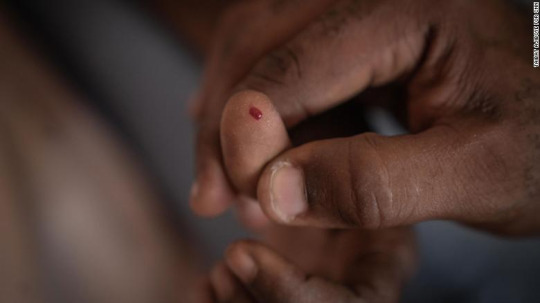
A volunteer doctor brought his own kit to do blood tests at the Durumi camp
'A woman who falls through the cracks is falling with her children'
African NGO, Pro Health International, has been sending volunteer medical professionals to provide free healthcare services for IDPs across Nigeria for over 12 years. They were last in Durumi in June and describe it as one of the most impoverished IDP camps within the Federal Capital Territory (FCT), where Abuja is located.
Pro Health International Founder and Executive Director Dr. Iko Ibanga shared that his team raised the issue of health challenges within IDP camps two years ago with the Minister of Health at the time, Dr. Osagie Ehanire. "We were told it would be looked into, but nothing was done," he says.
Ehanire did not directly respond to CNN about whether Pro Health International raised the issue of health challenges among internally displaced people with him, but the former health minister highlighted the NGO's work as a useful implementer of maternal health services in more recent years, and shared emergency response plans for IDPs that were put in place in the north-east of the country (where Boko Haram is most active) and go back to 2016. He tells CNN: "Women's Health services were prioritized and featured strongly in the programs designed to the needs of internally displaced women." This region does not include Abuja, however, where the Durumi camp is located.
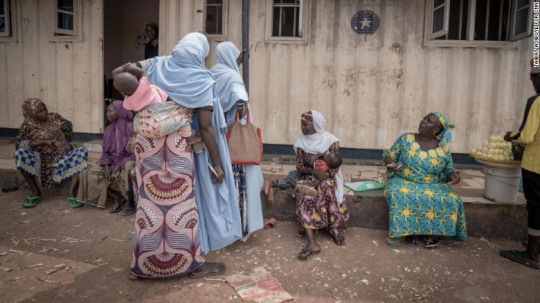
Women at the Durumi IDP camp, sitting on the veranda of the makeshift health post
The 2023 health budget is ₦1.17 trillion ($2.2bn), which is a 42.6% increase since 2022 and the highest percent of the total budget allocated for health. But In Africa's largest economy, this is only 5.7% of the annual budget of ₦20.5 trillion, and is much lower than the 15% of annual budgets all African Union member nations, including Nigeria, pledged in 2001 to spend on "improvement of the health sector".
According to the National Primary Health Care Development Agency, a health post, which is the most basic health care facility, should be able to cater to a population of 500 and have 34 items always available to serve that population. Durumi's health post serves more than 3000 people and has just 10 of these items: a waste bin, scissors, fetoscope, weighing scale, chair, tables, two beds, kidney dishes, and a cupboard, all provided by NGOs according to Ayuba and Umar who say they both manage the facility without a salary.
Nzelu shares that the Ministry of Health is currently conducting a health needs assessment in most of the IDP camps to learn what is and is not lacking to ensure adequate health care services. He tells CNN: "With the budget cycle currently on, it can inform some of the things we are able to get into the budget and hope that the National Assembly gives approval so that we can implement."
Pro-Health International's Ibanga is emphatic about the risks displaced people face during the perinatal period and beyond. "When [a woman] is ill, it affects everything tied to her and her children are the most important things tied to her," he says. "A woman who falls through the cracks is not falling by herself. She is falling with her children."
This story was edited by Eliza Anyangwe and Meera Senthilingam
#Nigeria#Nigerian women#Maternal health#Pregnancy while displaced#As Equals#Durumi Camp#Abuja#Book harassment#internally dispaced people (IDPs)#A refugee camp had only one birth attendant#The birth attendant didn't always have surgical gloves#Folic Acidcosts ₦3000 ($3.74) for 100 tablets#Refugees and access to clean water#Refugees and malnutrition#Refugees and preventable diseases#Refugees and access to birth control#A woman who falls through the cracks is falling with her children
10 notes
·
View notes